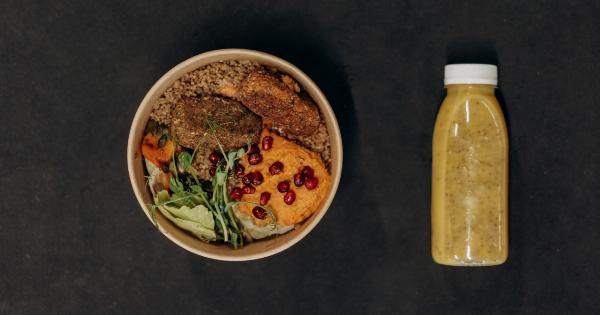Quinoa is a highly nutritious grain that has gained popularity in recent years due to its numerous health benefits. It is often referred to as a superfood, thanks to its high nutrient content and potential to improve overall health.
Quinoa is not actually a grain but a seed, which is why it is often considered a suitable alternative for those who follow a gluten-free or grain-free diet. The scientific name for quinoa is Chenopodium quinoa, and it belongs to the amaranth family.
Quinoa’s Nutritional Composition
Quinoa is a rich source of essential vitamins, minerals, and antioxidants, making it an excellent addition to a balanced diet. The following nutrients can be found in a single cup (185 grams) of cooked quinoa:.
– Calories: 222.
– Carbohydrates: 39 grams.
– Protein: 8 grams.
– Fat: 4 grams.
– Fiber: 5 grams.
– Manganese: 58% of the daily recommended intake.
– Magnesium: 30% of the daily recommended intake.
– Phosphorus: 28% of the daily recommended intake.
– Folate: 19% of the daily recommended intake.
– Copper: 18% of the daily recommended intake.
– Iron: 15% of the daily recommended intake.
– Zinc: 13% of the daily recommended intake.
– Potassium: 9% of the daily recommended intake.
– Vitamin B6: 11% of the daily recommended intake.
Health Benefits of Quinoa
The consumption of quinoa offers a range of potential health benefits. Let’s delve into some of the primary advantages:.
1. High Nutrient Content
Quinoa is a nutrient powerhouse, providing an abundance of vitamins, minerals, and antioxidants.
It contains all nine essential amino acids, making it a complete protein source suitable for vegetarians, vegans, and those looking to reduce their meat consumption.
2. Improved Digestive Health
The high fiber content in quinoa promotes healthy digestion and helps prevent constipation. Dietary fiber aids in bulking up the stool and facilitates regular bowel movements.
Consuming fiber-rich foods like quinoa can assist in maintaining a healthy digestive system.
3. Gluten-Free Alternative
Did you know that quinoa is naturally gluten-free? This makes it an excellent alternative for those with gluten sensitivity, celiac disease, or those who follow a gluten-free diet.
Quinoa can be utilized as a substitute for wheat, barley, and rye, making it an essential ingredient in gluten-free recipes.
4. Blood Sugar Regulation
Quinoa has a low glycemic index, which means it does not cause a rapid spike in blood sugar levels after consumption.
This is beneficial for individuals with type 2 diabetes, as it helps regulate blood glucose levels and promotes stable energy throughout the day.
5. Heart-Healthy Properties
Quinoa is rich in heart-healthy monounsaturated fats and omega-3 fatty acids. These healthy fats help reduce the risk of heart disease, lower bad cholesterol levels, and decrease inflammation in the body.
Incorporating quinoa into your diet can contribute to better heart health.
6. Weight Management
The high protein and fiber content in quinoa can aid in weight management and promote feelings of fullness. Protein helps increase satiety, reducing the likelihood of overeating or snacking on unhealthy foods.
Additionally, the fiber content in quinoa slows down digestion, keeping you satisfied for longer periods.
7. Antioxidant-Rich
Quinoa contains a range of antioxidants, such as quercetin and kaempferol. These compounds help neutralize free radicals in the body, protecting cells from oxidative damage.
Regular consumption of quinoa may contribute to overall well-being and reduce the risk of chronic diseases.
8. Improved Bone Health
Quinoa is an excellent source of several minerals crucial for maintaining optimal bone health, including magnesium, phosphorus, and manganese. These minerals contribute to bone density and help prevent conditions like osteoporosis.
9. Enhanced Brain Function
The magnesium and essential fatty acids present in quinoa are beneficial for brain health. Magnesium is involved in numerous cognitive functions, and omega-3 fatty acids contribute to brain development and help combat age-related cognitive decline.
10. Versatile and Easy to Incorporate
Quinoa is incredibly versatile and can be easily incorporated into various dishes. It can be used as a substitute for rice, added to salads, soups, stews, and even used in baking.
Its mild, nutty flavor makes it an appealing addition to many recipes, providing an extra nutritional boost.
Conclusion
Quinoa is undoubtedly a superfood that offers a plethora of health benefits.
From its high nutrient content to its potential to improve digestive health, regulate blood sugar levels, protect the heart, aid in weight management, and enhance brain function, quinoa is an excellent addition to any diet. Its versatility in the kitchen makes it easy to incorporate into a wide range of recipes, allowing you to reap the advantages of this nutritious pseudograin.































